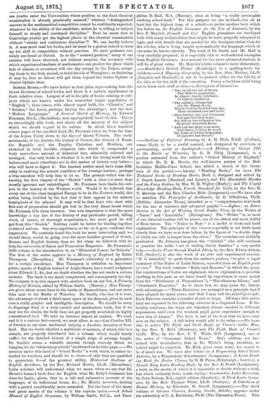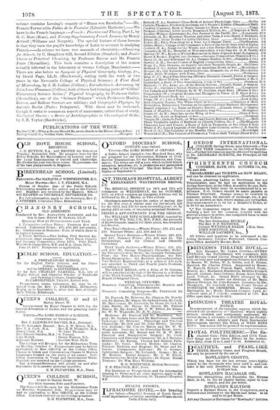their relative sizes. Largest of all is tho pile of
books relating to sub- jects which are known under the somewhat vague appellation of " English "; then comes, with almost equal bulk, the "Classics," and " Science," the latter, perhaps, having the advantage ; and the last,
"Modern Languages." A General Sketch of History, by Edward Freeman, D.C.L. (Macmillan), may appropriately head the list. This is
an exceedingly able book, and shows all the mastery of the subject which we should expect in its author. In about three hundred octavo pages of the smallest kind, Mr. Freeman takes us from the time of the Aryan Unity down to the days of Queen Victoria. The early movements of the Aryans, the history of Greece, the history of Rome, the Republic and the Empire, Christian and Heathen, are sketched in brief, forcible chapters, into which is compressed a truly marvellous amount of historical fact, admirably selected and arranged. Our only doubt is whether it is not too strong moat for the babes—and most schoolboys are in this matter of history very babes— who will have to digest it. The learned author must have some diffi: (sully in realising the mental condition of the average learner ; perhaps a true anecdote will help him to do so. The present writer was dis- cussing the first chapter of the "Sketch" with a class not more than usually ignorant and unintelligent. Mr. Freeman here limits his sub- ject to the history of the Western world. Would it be believed that every one of the class imagined Europe to be in the Eastern world, this notion being fortified by the fact that it does appear in the eastern hemisphere of the atlases? It may well be that boys who start with this sort of preparation should get lost in the very dense forest which Mr. Freeman bids them traverse. Our own impression is that the more knowledge a boy has of the history of any particular period, falling short, of course, of thorough acquaintance, the more good he will get from this "Sketch." Nothing could be better for binding together scattered notions. Our own experience, as far as it goes, confirms this impression. We certainly found the book far more interesting and, we should fancy, useful in going over the more familiar ground of Greek, Roman, and English history, than we did when we followed with its help the succession of Saxon and Franconian Emperors. Mr. Freeman's little volume is the introduction to an "Historical Course for Schools." The first of the series appears in a History of Englanc4 by Edith Thompson. (Macmillan.) Mr. Freeman's editorship is a guarantee for a certain excellence. Miss Thompson is orthodox on important points, speaks of English instead of Anglo-Saxon, has a sound judgment about Edward L, &c., but we doubt whether she has not made a serious mistake. The book is too much compressed, and consequently too dry. We compare it in this respect with another book on our list, A Primary History of Britain, edited by William Smith. (Murray.) Miss Thomp- son gives about seven lines to the battle of Bannockburn, and not more than nine to the Battle of Waterloo. Dr. Smith, who has, it is true, the advantage of about a third more space at his disposal, gives in each case a really graphic and intelligible description. We should be sorry to disparage what is a very careful and meritorious work, but if wo may use the simile, the body does not get properly nourished on highly concentrated food. We take an instance almost at random. We read, and it is a curious fact—novel, we must allow, to us—that Charles XIL of Sweden at one time meditated helping a Jacobite invasion of Scot- land. But we doubt whether a multitude of matters, of which this is a sample, are properly introduced into a volume which would barely suffice for the detailed history of a single reign of average length. Dr. Smith's seems a valuable manual, though scarcely fitted, we imagine, for the "elementary schools " mentioned on its title-page.—We mention under this head of " School Books " a work which is rather in- tended for teachers, and should be to them—if only they are qualified to appreciate it—of the greatest utility, Historical Outlines of English Accidence, by the Rev. Richard Morris, LL.D. (Macmillan.) Latin scholars will understand what we mean when we say that Dr. Morris's learned book does for English what Mr. Roby's Grammar has done for Latin; given, that is, a full and exhaustive account of the language, of its inflexional forms, &c. ; Dr. Morris, however, dealing with a period considerably more extended. Not the least of the many and great merits of the volume is the copious index.—A School Manual of English Grammar, by William Smith, D.C.L., and Theo- philus D. Hall, M.A. (Murray), aims at being "a really serviceable working school-book." For this purpose we are inclined—for all at least but the highest form of a school—to prefer another book which lies before us, An English Grammar for the Use of Learners, by the Rev. F. Meyrick (Cassell and Co.) English grammars are burdened both with many technicalities that might be more properly relegated to logic, and with details that are needed for the foreigner rather than for the scholar, who is being taught systematically the language which in one sense he knows already. The work of Dr. Smith and Mr. Hall is very carefully prepared ; it is especially rich in well-selected examples from English literature. As a manual for the more advanced student, it will be of great value. Mr. Meyrick's little volume is more elementary. —Routledge's British Primer (Routledge) is a spelling-book for children.—A Rhyming Geography, by the Rev. Alex. Mackay, LL.D. (Simpkin and Marshall), is not to be praised either for the felicity of the idea or for the skill of the execution. Fancy a luckless child being set to learn such stuff as this,—a description of Greece !-
" Two thirds the size of Scotia, Two fifths its population ; In climate, beauty, loveliness, Of highest reputation.
"The capital is Athens fair (On the ./Egean shore), Which Cecrops founded long ago, Three thousand year and more.
"Here Science, Art, and Literature For ages bad their home; But Athens was eclipsed at last By proud, victorious Rome.
"And now her glory is no more, And Greece is but a by-word, The home of lawless brigandage, Of anarchy and discord."
—Outlines of Political Economy, by A. H. Dick, D.S.C. (Collins), seems likely to bo a useful manual, not disfigured by crotchets or partisanship, social or theological.—A History of George III. to the Battle of Waterloo, by G. R. Gleig (Longmans), is a portion extracted from the author's " School History of England," to which Mr. E. E. Morris, the well-known master of tho Bed- fordshire Middle-Class School, has added a sketch of the litera- ture of the period.—Among " Reading Books," we have The Technical Series of Reading Books, Book 5, designed and edited by J. Stuart Laurie (Marshall and Laurie), and The Marshfield Maiden and the Fairy Ordina, by Mrs. W. H. Wigley (Mnrby); and The Useful Knowledge Reading-Book, Fourth Standard for Girls, by the Rev. E. T. Stevens and the Rev. Charles Hole (Longmans).—We have also to mention The Principles of Arithmetic, by D. O'Sullivan, Ph.D. (Dublin : Alexander Thom), intended as a "comprehensive text-book for the use of teachers and advanced pupils."—Iophon : an Intro- duction to the Art of Writing Greek Iambic Verse, by the Writer of Nuces " and "Lucrotilis." (Rivingtons.) The " Writer " is, as most of our classical readers will be aware, one of the ablest and most skilful of Eton tutors. The "Notice to Boys" is a model of terse and lucid explanation. The principle of the ccesura especially is sot forth more clearly than we have seen done before, by the figure of "a double slope of which one side is longer than the other." The exercises are skilfully graduated. Mr. Johnson has given tho " faithful " who still continue to practise the noble " art of writing Greek Iambics " a very useful help.—Latin Prose through English Idiom, by the Rev. Edwin Abbott, D.D. (Seeleys), is also tho work of an able and experienced teacher. "It is intended," to quote from the author's preface, "to give a rapid summary of the Rules of Latin Syntax, regarded from an English point of view." The book contains "Rules and Reasons," in which the pecu- liar constructions of Latin are explained, where explanation is possible (nothing in this part, as we have found by experience, is more useful than the "Dictionary of Prepositions"), "Miscellaneous Idioms," and "Graduated Exercises." As to these last, we may quote Dr. Abbott with advantage :—" These Exercises are arranged on a principle that I have adopted for many years, and that I may call the pitfall principle. Each Exercise contains a number of pits or traps. All traps that prove fatal are repeated in the following exorcise in a disguised form. If the fatality continues, the traps are repeated, always masked in different expressions, until oven the weakest pupil gains experience enough to warn him of danger." The book is one of the bast that we have over seen on the subject. A full index would add to its valne.---We have also to notice The Fifth and Sixth Books of Ccesar's Gallic War, by the Rev. T. Kirk (Bemrose), and The Fifth Book of aesar's Gallic War, by the Rev. J. T. White, D.D. (Longmans), one of the series of "Grammar School Texts." Both editions are fur- nished with vocabularies, that in Dr. White's being excellent, as indeed might be expected. Mr. Kirk gives some notes, too scanty to he of much use. We have also before us A Preparatory School Latin Delectus, by a Preparatory Schoolmaster (Longmans); A Latin Read- ing Book for Junior Classes, by D. IL Paton (Edinburgh : Laurie); a Second Easy Latin Reading Book, by the Rev. E. Fowle (Longmans), a book on the merits of which it is impossible to decide without a trial, but which certainly looks worth trying ; Constructive Latin Exercises, by John Robson, B.A., eighth edition (Stanford); A First Latin Gram- mar, by the Rev. Thomas White, LL.D. (Seeloys); A Catechism of Roman History, by Elizabeth M. Sewell (Longmans).—The third volume of German Classics, Leasing, Goethe, &hiller, appears under the editorship of C. A. Buchheim, Ph.D. (The Clarendon Press). This volume contains Lessing's comedy of "Minna von Barnhelm."—Mr. Francis Tarver edits Fables de la Fontaine (Librairie Hachette).—We have in the French language :—French : Practice and Theory, Part L, by G. C. Mast (Beau), and Twenty Supplementary French Lessons, by Henry Attwell (Williams and Norgato). The special feature of these lessons is that they turn the pupil's knowledge of Latin to account in studying French.—In science we have two manuals of chemistry,—Chemistry for Schools, by C. Haughton Gill, Second Edition (Stanford), and Junior Course of Practical Chemistry, by Professor Roscoe and Mr. Francis Jones (Macmillan). This book contains a description of the course actually followed in the laboratory of Owens College, Manchester.—, There are also before us Synopsis of Physical Geography, Geology, by David Page, LL.D. (Blackwood), setting forth the work of two years in the Newcastle College of Physical Science ; A First Book of Mineralogy, by J. H. Collins (Collins) ; Introduction to Astronomy, by John Isaac Plummer (Collins), both of these last forming parts of "Collins' Elementary Science Series ;" Physical Geography, by Professor Geikio (Macmillan), one of the "Science Primers" which Professors Huxley, Roscoe, and Balfour Stewart are editing ; and Geographie Physique, by Antonio Roche (Paris : Delagrave). With those may be reckoned, though it seeks to assume an aspect of amusement, rather than of study, Geological Stories : a Series of Autobiographies in Chronological Order, by J. E. Taylor (Hardwicke).































 Previous page
Previous page